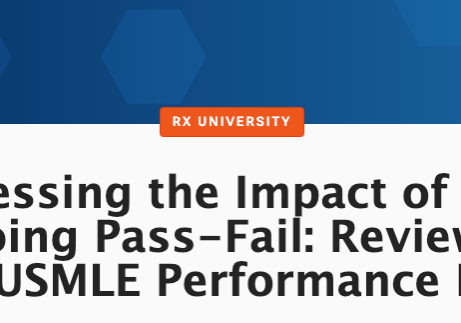By Luke Murray
 This post is part of a series called “Med School Done Right,” which will look at not just succeeding in medical school in the narrow terms of “getting good grades,” but at shaping the kind of experiences you want to have during these (usually) four very important years of your life.
This post is part of a series called “Med School Done Right,” which will look at not just succeeding in medical school in the narrow terms of “getting good grades,” but at shaping the kind of experiences you want to have during these (usually) four very important years of your life.
We all know the feeling. You get a test back, and the score is lower than you were expecting (or hoping) it would be. You go through the stages of mourning: fear, denial, anger, sadness, acceptance, etc. Sometimes these emotions happen in a flash. Other times, they may take weeks to get through. But we all spend at least some time feeling a bit of regret. The thought process is some version of “I could have done better” followed by a form of emotional or psychological self-flagellation.
While the belief that you could have worked harder is probably true, I want to talk about a more nuanced approach to avoiding this feeling of regret or disappointment – one that includes more than the vague, and subsequently unfruitful, aim to “work harder next time.”
What you need to take into account during these moments of self-doubt, no matter how upset you might be about your grade, is that you probably have other things you care about besides your exam scores. These other things probably took away time from studying and are at least part of the reason why you didn’t do as well as you could have, but it doesn’t mean you necessarily need to do anything different. The question you should be asking in this case is:
“Were the things I gained besides my best possible score worth it?”
Perhaps you have a better relationship with your girlfriend/boyfriend or more progress on research. If these are in line with significant goals you have, then avoiding regret is more a matter of reconciling these tradeoffs than it is beating yourself up over not being perfect at one of them and setting unrealistic goals of being perfect next time. If, on the other hand, all you have to show is a few extra hours of TV watching or something else you would not consider significant to you, it makes sense to make a plan like “I’m going to stop watching TV and spend more time studying.”
Asking yourself the question “Were the things I gained besides my best possible score worth it?” leads now to a more specific and actionable goal (“no TV”) that’s in line with your priorities. This bit of self-reflection will provide you with the opportunity to figure out when and why you may be wasting time in ways that aren’t worth it and encourage you to come up with a plan to avoid repeating this somewhat destructive behavior when those tempting situations arise in the future.
So ultimately, if you have more than “get great grades on every test” on your list of objectives for medical school, avoiding regret is more about consciously choosing the things you want and accepting the prices you will have to pay in order to have them…including, perhaps, that perfect test score…than it is about beating yourself up, calling yourself stupid, and passionately but vaguely vowing to “do better next time.”




excellent points altogether, you simply won a new reader. What might you suggest about your submit
that you simply made a few days ago? Any certain?